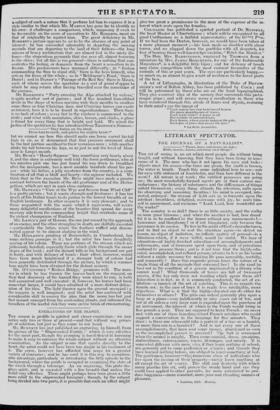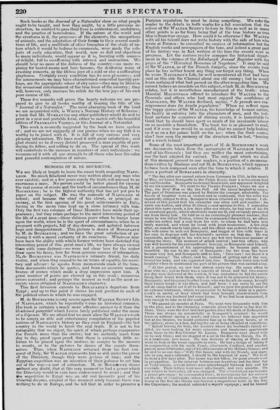LITERARY SPECTATOR.
THE JOURNAL OF A NATURALIST*.
" Plants, trees, and stones, we note ; Birds, insects, beasts, and many rural things."
THE art of seeing is an art which most people die without being taught, and without knowing that they have been living in igno- rance of it. The man who has it not opens his eyes and looks : objects meet his senses—the trees are green, the earth is brown, the water is bright. Teach this same individual how to see—rub his eyes with ointment of knowledge, and then how different is the scene ! All nature is at work ; the subtlest processes are going on; the most wonderfully-formed agents are at their curious ma- nufactures ; the history of substances and the differences of things unfold themselves ; every thing attracts his attention, calls upon his observing and reasoning faculties ; his mind is occupied, inte- rested, enlarged : the stream of light sets in in torrents upon the intellect : breathless, delighted, overcome with joy, he seats him- self in amazement, and exclaims " Lord, Lord, how wonderful are thy works!"
The country is so dull ! there is so little society, and the walks so soon grow tiresome ; and when the weather is bad, how dread ful it is to be confined to the house without any amusements !- Ignorance and blasphemy! or if not blasphemy, only because the ignorance is its excuse. To live in the midst of God's manufactures, and to find no object to rest the :Mention upon—to detect no lesson, no object of imitation, no infinite matter of perusal—is a blindness which, if it were wilful, would be sinful. We hear of education—of highly-finished education—of accomplishments and refinements, and of treasures spent upon them, and of privations endured to procure them ; and is it not true that the highly-edu- eated, accomplished, and refined person, returns to her or his home without a single resource for making life pass agreeably, usefully, and innocently ? Does this exquisite person know the nature of a single thing of all the myriads that surround her? Is she (and he too) not in the condition of a person imprisoned in a library who cannot read ? What thousands of tomes are full of treasured sweets, if the key only were not wanting which opens them all ! Education is in fact, as it is commonly conducted, the art of ex- hibition—a branch of the art of catching,. This is as regards the female sex : in the case of boys it is really less intelligible, more objectless. What is it that the highly-educated can do either for themselves or others ? The girls can indeed generally play upon a harp or a piano—very indifferently in nine cases out of ten, and not at all unless a very large sum is expended upon the purchase of an instrument, the interest of which in the Funds would bring in five pounds a year. They are supposed to learn French : we never met with one of these boarding-school French scholars who could support a conversation in the language for five minutes. They draw : is there one who could take a portrait of a tree or a hamlet, or more than one in a hundred ? And is not every one of these accomplishments, that have cost sonic money, abandoned as soon as the accomplished person is married ? he lent is consumed when the animal is caught, Then come scandal, dress, gossiping, slatternliness, extravagance, waste, ill-temper, and misery. It is somewhat different with men, who, if they learn nothing at school, are generally put to some profession or a trade ; and though they have learned nothing before, are obliged to learn something at last. The gentlemen, however—the: mimerous class of individuals who live upon the income of their property—rarely learn anything at all except the art of venery-. The skill and dexterity with which many practice this art, only proves the steady hand and eye they could have applied to other pursuits, far more calculated to pro- duce happiness—more constant, more pure and elevating sources of pleasure.
* London, 1829. Murray.
Such books as the Journal of a Naturalist show us what people ought to be taught, and how they might, by a little previous in- struction, be enabled to pass their lives in contentment, usefulness,• and the practice of benevolence. If the nature of the world and The creatures in it, the processes of the elements, the occupations of animals, and the adaptation of their forms to their several condi- tions of life, and a multitude of other branches of the study of na- ture which it would be tedious to enumerate, were made the sub- jects of early education, that world, now so dull and objectless to many individuals, would appear as it is, bursting with sources of delight, full to overflowing with interest and instruction. We should hear no more of the dulness of the country—no more re- pining for heated rooms and bare bosoms, the deafening noise of crashing concerts, or the lifeless joys of a cold or else a suffocating playhouse. Certainly every condition has its own pleasures ; and the amusements we may have characterized somewhat harshly per- haps, are the appropriate solace of city cares—they may be likewise the occasional entertainment of the true lover of the country ; they -will, however, only increase his relish for the true joys of his own pure. course of life.
These few remarks will prove the hearty welcome we are pre- pared to give to all books worthy of bearing the title of the "Journal of a Naturalist." The most charming book of the kind we are acquainted with, is WHITE'S Natural History of Selborne ; a book that Mr. MURRAY (or any other publisher) would do well to print in a neat and portable form, either to match with his beautiful edition of FRANKLIN'S Voyages, or this Journal of a Naturalist.
This work is avowedly suggested by the book we have spoken of ; and we are not. niggardly of our praises when we say that it is worthy to be joined with it. It is full of very curious and very pleasing information. We have read it with great satisfaction ; and glad should we be if every district possessed a man capable of pro- ducing its fellow, and willing to do so. The spread of this work will contribute to the increase in numbers of such individuals : we recommend it with all our strength to all those who love the calm and peaceful contemplation of nature.



















 Previous page
Previous page